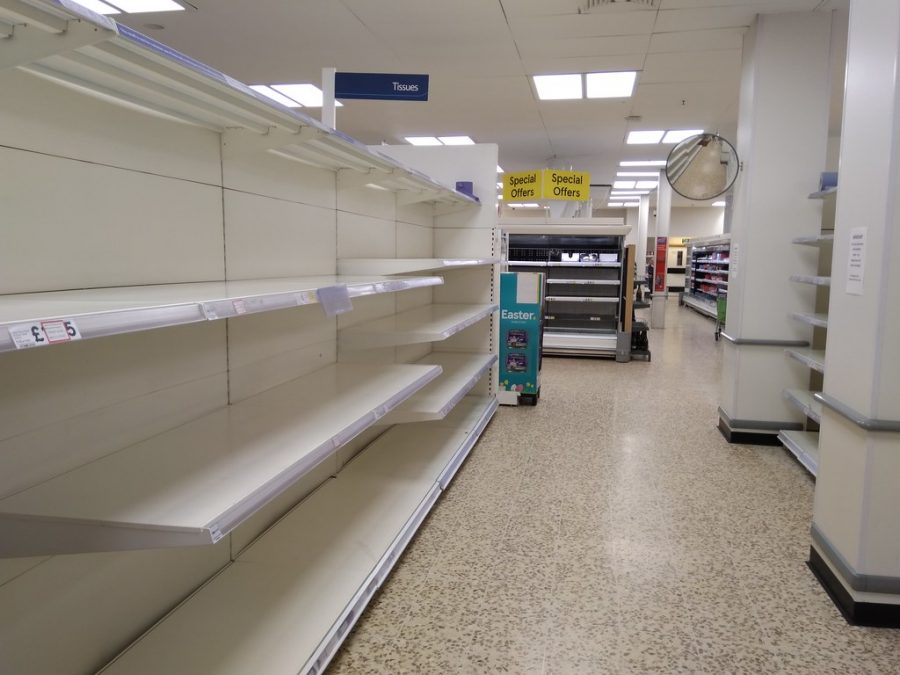Hoarding Greed and Fear: The Other Pandemic
May 15, 2020
The effects of COVID-19 have had negative ramifications throughout our community, state, country, and the world. Together, we can overcome this adversity; however, if we continue to distance ourselves from one another, not just physically, but mentally, overcoming these new challenges will only become increasingly difficult. This includes not only remaining whole in times when we divide in self isolation, when we must alter almost everything in our daily lives, but also remaining overly conscious of the needs of others. A lack of certainty, about the present and future, has heightened our fears and suspicions of the outside world. This uncertainty helps generate an “us versus them” mentality—a mentality which has intensified the hoarding phenomenon that now spreads like a virus itself across the United States. Many people didn’t give the virus a second thought, maybe a word here or there after watching a passing news report—until the virus finally came, leaving the majority of us blindsided, unprepared, and frightened.
According to the Montreal Gazette, one of the root causes of recent widespread hoarding is our evolutionary fear of any potential threat to our wellbeing: starvation being one of the most prominent anxieties. People pay far more attention to negative news than positive news. We are absorbed by death, violence, war—outbreaks. Twenty-four hour news cycles and social media only aid the rapid spread of threat, the fear it induces, and blurs both fact and fiction about developments and reality. Friend groups tend to circulate the worst of the news, which has recently dominated almost all media, in attempts to inform and protect their friends, an action which often worsens mentalities. Though we would not like to believe so, some news sources may be exaggerating their information or statements for views. Negative news sells, even more than miracles. The engrossing attention to news is for the most part, however, a necessary evil.
Junior Clair Waddell, whose father is currently working at Mississippi’s St. Dominic’s Hospital, in the front lines against COVID-19, is cautious about the future. “I’m afraid of the effects the virus could have on society, not only with sickness and death toll, but also with the morality of the nation overall,” Waddell said.
The supplies in the highest demand, as we have all seen through empty shelves and, at times, entire isles, are toilet paper, hand sanitizer, masks, and gloves. Staple foods, such as bread, rice, and milk, were originally swept off of the shelves faster than stores could replenish them, sometimes by only a few people who had simply been consumed by panic. At first, people were buying a month’s worth of food in one trip, four times more food than the store was prepared to supply for their average customer. As a result, many grocery stores have limited customers to only three staple foods and supplies, individually, per purchase. According to USA Today, a two week supply of food is a sufficient reserve, any more being gluttonous. The Centers for Disease Control and Prevention also recommends a two-week supply and yet the Department of Homeland Security claims that people should store a two-week supply with “additional” goods. In stark contrast, Food and Drug Administration commissioner Stephen Hahn recommends only buying a week’s worth of “essentials.”
It’s hard to find a balance between safety and necessity. We are meant to avoid people at all costs, venturing only to the store when absolutely necessary, but how often are we actually supposed to do so? Why would we not gather as many supplies as possible in one trip to avoid future contact? The amount of mixed messages reflects a dangerous cycle: people hoard in a panic, others hear of the dwindling supplies and then attempt to hoard as well in order to protect themselves and loved ones. Hoarding not only ensures safety, at the risk of the entire community’s well being, but also helps people feel more in control and, when all of society is fighting against an invisible foe, with misinformation everywhere, it worsens the impulse to hoard. The solution? We need to encourage collectivism and social responsibility and, what may have a surprisingly big impact, a lessening of our intake of negative media.
Upper School Learning Facilitator Mrs. Marjanovic, whose daughter suffers from diabetes and is thus put in peril by the virus and the lacking supply of goods, which may eventually include insulin, believes we could use this time of disconnection to reconnect.
“There is a silver lining in this for families,” Marjanovic said. “The world may never stop like this again for us to be together and in the face of pandemic, I hope we realize the precious time that we can spend together making fun memories. My daughter said to me about day 3 of our isolation, ‘Mom, if you slow down, you can discover new things.’ We were out on a walk and I wanted to go fast and she wanted to look at leaves. That has become our mantra, we are taking things slow. Playing lengthy games like Monopoly and Catan. Taking on bigger crafting and cooking projects, because we can. I’m hoping that they will remember this time fondly…I try to frame this as a time when everyone stopped so we can love our neighbors by stopping a virus. My prayer is that they don’t become consumed with fear and worries about safety.”



